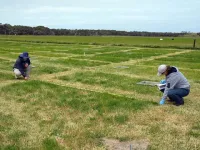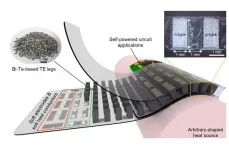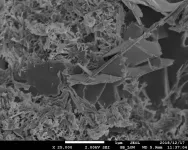(Press-News.org) The remote learning experience of parents who had their children at home in Spring 2020, as schools across the US closed during the United States' COVID-19 lockdown, was more positive than widely believed.
That is the suggestion from a new study published in the Journal of School Choice, which looked at the experience of a nationally representative sample of 1,700 parents stretching right across America.
On average only 44% of parents reported the online learning program required too much of parents, while 38% of parents said it was difficult for them to manage the online provisions.
However, worryingly, most parents (63%) believed remote learning caused their child to fall behind.
While the study focused on 3,414 children's parents' experiences, the results revealed to the experts from the University of Colorado, at Colorado Springs, a broad picture of the provision different types of schools offered too.
These findings show more than 80% of schools provided some type of remote learning after closing because of the pandemic. Parents generally rated the programs as effective and the resources as helpful, however most (67%) characterized their engagement as heavily involved daily.
Almost 30% of the time mothers and fathers managed the responsibility equally. Parents spent about 2.5 hours per day helping with schoolwork; children spent about an hour more each day in remote learning.
82% of participants reported their schools eventually developed some type of remote learning. 10% reported schools cancelled classes and provided no remote learning, with the remainder resuming or continuing classes until the end of the school year.
For families in schools cancelling classes and providing no resources, most students (49%) spent their time primarily watching TV and playing games. Only 28% engaged in a learning program created by parents. The remainder worked around the house, worked for pay, or pursued other interests.
Results were not, however, uniform across school type. According to parents, private schools frequently appeared to be the most responsive, engaged, and innovative, followed by charters and then traditional public schools.
Also contrary to predictions throughout summer 2020 about parents' school choices for Fall 2020, only a small percentage of survey respondents said they were going to homeschool in the new school year. However, more than a third planned to send their child to a virtual school. Of those who were not going to send their children to brick and mortar schools, concern about their child's health was the dominant and predictable motivation.
"This suggests if there was going to be a significant shift in the education sector, it would be to virtual schools rather than homeschooling," said the study's lead author, Dr Dick Carpenter, "and the shift would likely be temporary, assuming COVID-19 is mitigated."
The study results, although specific only to Spring 2020, provide important information about remote learning in the future.
"Schools rated as most effective were those that more often chose to communicate with students, create real-time, online programs, and set higher expectations," described Dr Carpenter.
The survey featured 44 mostly closed-ended questions about the resources families had during at-home schooling, how children spent their day, how much time was spent on schoolwork, communication with school, assessment of the experience, plans for the 2021 school year, and basic demographics.
Correspondents were spread across various schools - public (84%), private (10%), and charter (6%).
Hopefully, as remote learning continues in schools internationally, officials can apply these findings "to offer the most effective learning possible to students," report co-author, Dr Joshua Dunn, also a professor at UCCS, says.
"Despite the better-than-expected experience in the spring, many parents we surveyed were still concerned about their child's academic future because of school closures. Schools need to apply lessons learned from this study to provide the best and most equitable remote learning possible under circumstances like this," Dunn concluded.
The majority of survey correspondents were white females. More than 50% held at least a college degree. Slightly more than 60% reported household incomes of greater than $50,000. Additionally, respondents' mean age was 39 and the mean number of children per respondent was two.
Almost 76% of respondents were married. A little more than half of respondents were working full time when data were collected. The next largest percentage (18%) classified themselves as homemakers. A little more than 60% of their spouses were working full time. Equal percentages of respondents and spouses were working part-time.
With this in mind, the study therefore has a slight limitation with the sample "perhaps skewing more toward women and people who have higher education levels completing the survey," the authors state.
"Moreover, by necessity, parents were instructed to answer questions thinking of their youngest child in a certain school type. This may result in responses more representative of children in younger grade levels," they add.
INFORMATION:
Yale researchers have devised a way to peer into the brains of two people simultaneously while are engaged in discussion. What they found will not surprise anyone who has found themselves arguing about politics or social issues.
When two people agree, their brains exhibit a calm synchronicity of activity focused on sensory areas of the brain. When they disagree, however, many other regions of the brain involved in higher cognitive functions become mobilized as each individual combats the other's argument, a Yale-led research team reports Jan. 13 in the journal Frontiers of Human Neuroscience.
"Our entire brain ...
A loss of biodiversity and accelerating climate change in the coming decades coupled with ignorance and inaction is threatening the survival of all species, including our very own, according to the experts from institutions including Stanford University, UCLA, and Flinders University.
The researchers state that world leaders need a 'cold shower' regarding the state of our environment, both to plan and act to avoid a ghastly future.
Lead author Professor Corey Bradshaw of Flinders University in Australia says he and his colleagues have summarised the state of the natural world in stark form to help clarify the gravity of the human predicament.
"Humanity is causing a ...
Tsukuba, Japan - Work causes so much stress that it's become a global public health issue. Stress's impact on mental and physical health can also hurt productivity and result in economic loss. A new study now finds that working people who regularly take walks in forests or greenspaces may have higher stress-coping abilities.
In a study published in Public Health in Practice, researchers led by Professor Shinichiro Sasahara at the University of Tsukuba analyzed workers' "sense of coherence" (SOC) scores, demographic attributes, and their forest/greenspace walking habits. SOC comprises the triad of meaningfulness (finding a sense of meaning in life), comprehensibility (recognizing and understanding stress), and ...
CLEVELAND, Ohio (Jan. 13, 2021)--If you're a bit more forgetful or having more difficulty processing complex concepts than in the past, the problem may be your menopause stage. A new study claims that menopause stage is a key determinant of cognition and, contrary to previous studies, shows that certain cognitive declines may continue into the postmenopause period. Study results are published online today in Menopause, the journal of The North American Menopause Society (NAMS).
It's commonly assumed that people's memories decline with age, as does their ability to learn new things and grasp challenging concepts. ...
The ability of our skin to protect us from chemicals is something we inherit. Some people are less well-protected which could imply an increased risk of being afflicted by skin disease or cancer. A new study from Karolinska Institutet in Sweden that has been published in Environmental Health Perspectives shows how the rate of uptake of common chemicals is faster in people with a genetically weakened skin barrier.
We are continually exposed to chemicals from many different sources, for example, food, hygiene products, cosmetics and textiles. Many people are also exposed to chemicals at their place of work which can constitute a work environment problem.
The protein filaggrin is important for the structure and moisture balance of the skin, properties that affect ...
January 13, 2021 - The element nitrogen is a double-edged sword. It is essential for growing plants and feeding people, but it is also a leading cause of pollution across the world. Only by using nitrogen more sustainably can the positive and harmful effects of nitrogen be balanced.
Xia (Emma) Liang, a member of the American Society of Agronomy, studies nitrogen loss during food production.
Liang and her team created a framework that accurately measures nitrogen loss across a wide variety of crops and food products. She recently presented their research at the virtual 2020 ASA-CSSA-SSSA Annual Meeting.
"This framework can capture the environmental impacts and societal costs of nitrogen ...
A thermoelectric device is an energy conversion device that utilizes the voltage generated by the temperature difference between both ends of a material; it is capable of converting heat energy, such as waste heat from industrial sites, into electricity that can be used in daily life. Existing thermoelectric devices are rigid because they are composed of hard metal-based electrodes and semiconductors, hindering the full absorption of heat sources from uneven surfaces. Therefore, recent studies were actively conducted on the development of flexible thermoelectric devices capable of generating energy in close contact with various heat sources such as human skins and hot water pipes.
The Korea Institute of Science and Technology (KIST) announced ...
A rare mineral that has allowed Roman concrete marine barriers to survive for more than 2,000 years has been found in the thick concrete walls of a decommissioned nuclear power plant in Japan. The formation of aluminous tobermorite increased the strength of the walls more than three times their design strength, Nagoya University researchers and colleagues report in the journal Materials and Design. The finding could help scientists develop stronger and more eco-friendly concrete.
"We found that cement hydrates and rock-forming minerals reacted in a way similar to what ...
Researchers from University of Hawaii and University of Florida published a new paper in the Journal of Marketing that argues that a biological account of human behavior, especially undesirable behavior, will benefit human welfare. This biological perspective can complement traditional psychological, anthropological, and economic perspectives on consumption, particularly with respect to the vital topic of self-control.
The study, forthcoming in the Journal of Marketing, is titled "Consumer Self-Control and the Biological Sciences: Implications for Marketing Stakeholders" and is authored by Yanmei Zheng and Joe Alba.
Society's understanding of human ills is constantly evolving. Many ill-advised consumer behaviors are conventionally viewed through a non-biological ...
CLEVELAND--The combined effectiveness of three COVID-prevention strategies on college campuses--mask-wearing, social distancing, and routine testing--are as effective in preventing coronavirus infections as the Pfizer and Moderna vaccines approved by the U.S. Food and Drug Administration (FDA), according to a new study co-authored by a Case Western Reserve University researcher.
The research, published in Annals of Internal Medicine, has immediate significance as college semesters are poised to start again--and as the distribution of approved vaccines lags behind goals.
The study found that a combination of just two common measures--distancing and mandatory masks--prevents 87% of campus COVID-19 infections and costs only $170 per infection prevented. ...




